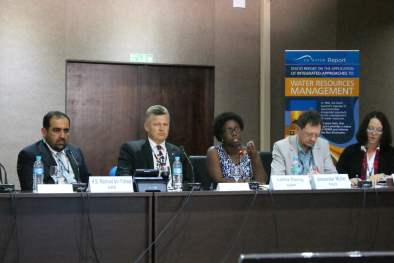“The 2012 UN-Water report provides a breakthrough in reporting on WRM. It assesses progress on the application of integrated approaches to water resources development, management and use as set out in Rio 20 years ago. It also indicates progress on IWRM planning as set out in the WSSD Johannesburg Plan of Implementation and confirms that this ‘remains relevant and must be a key component of emerging strategies in the context of sustainable development and poverty eradication and a key element in building climate resilience’”, Dr Obeng said.
The report reaffirms the global community commitment to the integrated water resources management approach. It shows that since 1992, 80% of the 130 countries participating in the survey, have embarked on reforms to improve their enabling environment, based on the application of the integrated water resources management approach.
Dr Obeng said: “The report is extensive, addressing social, economic and sustainability aspects and, for the first time, financial and investment aspects. Also, it makes a link between means (integrated approach) and ends (water security and growth). The survey shows that most progress is on the means (integrated approach) and that more work is needed to show how this is being translated into sustainable ‘ends’.”
The panelists described it to be “an excellent report on the implementation of IWRM”, and UN-Water said that there was an impressive interest from the countries to contribute to reporting about their achievements and experiences. According to the survey, countries report that improving policies, laws and institutional structures lead to better water resources management practices.
Dr Obeng stressed that there is a need for real leadership: “One of the key objectives of water day is to demonstrate to decision-makers in particular that some of the major challenges facing humanity today are water resource-related. Unfortunately water is the natural resource that is most likely to be taken for granted in overall economic planning”. Dr Obeng finished by giving the following recommendations:
“GWP fully supports the recommendation to capitalize on the progress illustrated in the report, and ensure continuity through a specific target: establishment of a global reporting mechanism on national water resources management which UN-Water is committed to facilitate and coordinate.
In addition, the GWP recommends that each country be encouraged to develop by 2015, specific targets and timeframes for preparing and implementing a program of action and financing strategy to take its integrated approaches to water resources management forward for completion by 2030. UN Water could then monitor progress in countries.”
The panel concluded that “we cannot speak about sustainable development without including an IWRM approach. Business as usual is not working.”

